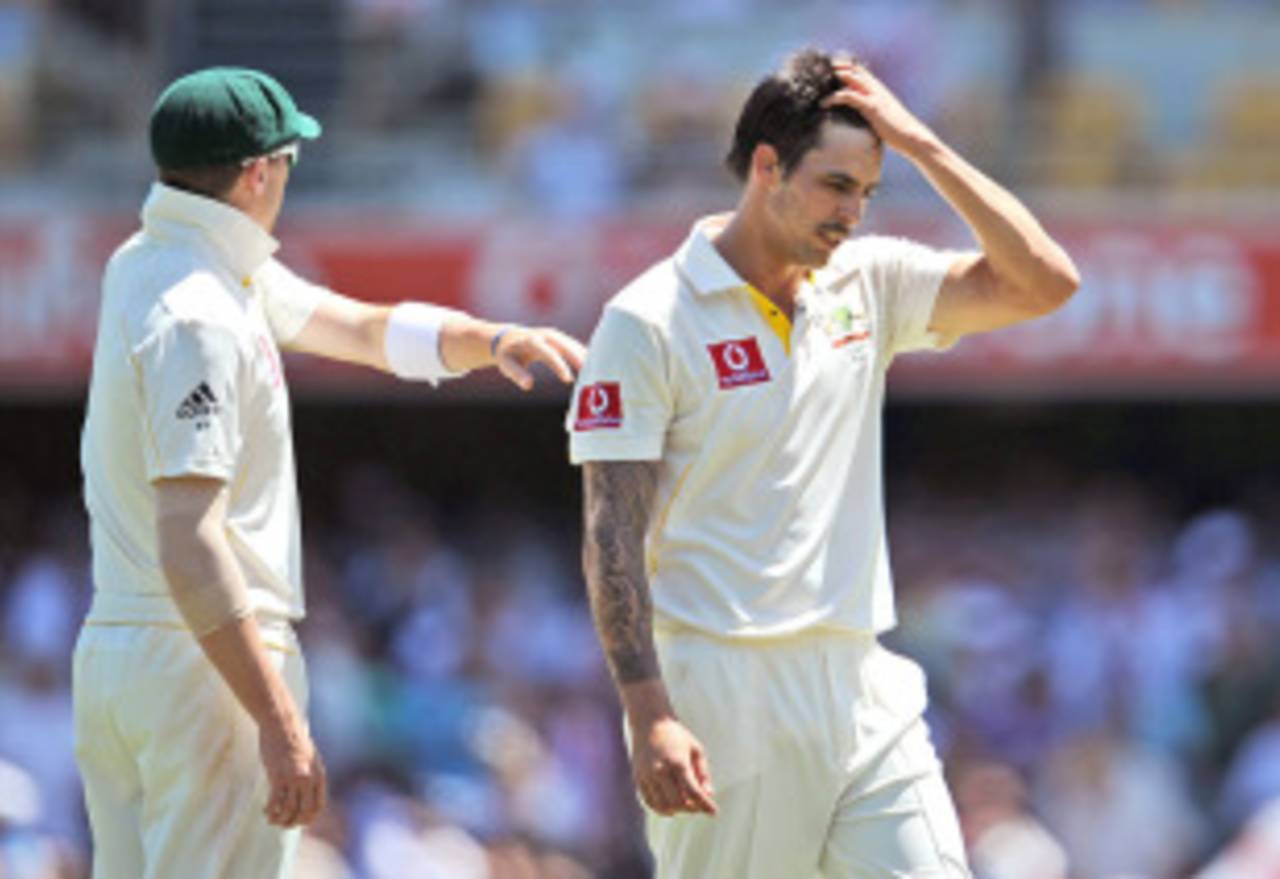The burden of expectation
The failures of Harmison and Johnson are not entirely their fault: we the public are partly to blame too, because we invest our hopes in them and expect too high a rate of return, and they go broke trying to meet the payments we demand.
Mike Holmans
Feb 25, 2013, 11:16 PM

The failures of Harmison and Johnson are not entirely their fault: we the public are partly to blame too • Getty Images
Reading a lot of the English coverage following the Melbourne Test, you'd have thought that England had achieved an overwhelming victory, but all they have managed so far is to guarantee that they will not lose the series. Granted, it's a major advance on getting thrashed every time they visit Australia, but the euphoria in the media on retaining the Ashes has been way over the top. Even the Australian press, from what I can gather, has been of the total gloom and doom variety even though Australia have not yet lost.
So far, England have outclassed Australia sufficiently to make it more than likely that they will at least not lose at Sydney and thereby win the whole series, when they will deserve all the encomiums currently being showered, but it's all a bit premature right now.
As is the hailing of Tim Bresnan as the new match-winning hero. He did indeed bowl well, but the real match-winning bowling came from Anderson and Tremlett on the first day: Bresnan simply hastened the inevitable.
The point is important because it would be unreasonable to expect Bresnan to carry on taking hatfuls of wickets. His real contribution will best be measured in future by the maidens column of his analysis, because his actual job is to maintain a suffocating control over the batsmen. If he's bowling at the likes of Cook and Trott or, more to the point, Kallis or Dravid, he isn't going to get them out because they are entirely content to let the scoreboard stand still while they bat if that's what it takes to keep their wickets intact. He is only a danger to good batsmen if they are willing to take the risk of trying to hit balls which are not there to be hit.
But having spear-carriers who can steal the scene relieves some of the burden of the leading players, which has not been a luxury afforded to the Australians as yet by their substitutes and late call-ups.
So unthreatening has Australia's bowling attack been that the burden of expectation on Mitchell Johnson is huge, and if he fails to live up to it, there is huge disappointment.
And it's my theory that it's that burden which weighs him down and prevents him bowling well with any regularity.
I see a great deal of similarity with Steve Harmison. Both he and Johnson burst to prominence with a series of outstanding performances which almost no-one had expected. But then, thrust into the spotlight as the standard-bearers, they found themselves under scrutiny the like of which they had never previously experienced, with every minor flaw and mistake endlessly dissected.
Both had a fair amount to dissect. Neither have a stable, easily repeatable bowling action, but one which has to be precisely right for things to work. Well-meaning attempts to help them with a bit of coaching simply serve to make them conscious of all the things which can go wrong. No longer can they bowl as instinct tells them, which was how they got to be selected to start with: now they worry about whether it is going to come out right, so they are tensed up with the inevitable consequence that it often does not.
And yet, because we know how brilliant they can be when they do get it right, we keep hoping that they will finally remember how to do it in the next match and all the ones which follow.
It is a catch-22. They can only succeed if they are not expected to, which means that you can only afford to pick them when you reckon you can get along without them – because if their first couple of overs reveal that the action is not in rhythm today, the captain will be best off ignoring them until tomorrow.
The failures of Harmison and Johnson are not entirely their fault: we the public are partly to blame too, because we invest our hopes in them and expect too high a rate of return, and they go broke trying to meet the payments we demand.
Well, that's a depressing thought with which to start the New Year, but may I wish everyone a happy one anyway.